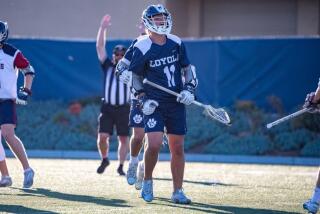Loyola’s Boys Run Extra Hard to Honor Coach
- Share via
With every stride and every drop of sweat, Mark Matusak was trying to send a message to heaven. So were Jordan Paul, Matthew Miller and the rest of the Los Angeles Loyola boys’ track team competing in the Southern Section championships Saturday at Cerritos College.
Their coach, Greg Wells, was buried Tuesday, 2 1/2 years after being diagnosed with prostate cancer. As the track coach since 1987, Wells touched many lives, but it was his current group of athletes who were determined to show what he had taught them.
A year ago, Loyola’s winning streak in dual meets was ended at 115 after a loss to Sherman Oaks Notre Dame. Some of the athletes were distraught, thinking they had let down the school and alumni.
Wells rejected such talk. He spoke to the team afterward and told them “to always keep your head up and bounce back,” Matusak recalled. “He was big on not dwelling on the past and moving forward.”
And so, on a blistering afternoon in which the race winners might have preferred receiving a bucket of ice instead of a medal, Loyola students put aside their grief and found a way to honor their coach with all-out effort.
In the end, though, the Cubs had to settle for second place in the Division II team competition, losing to Compton Dominguez, 65-58. Junior hurdler Elijah Wesson and junior triple jumper Richard Sherman came through with key victories late in the meet for Dominguez.
It didn’t take away from the single-minded focus of Matusak, the California-bound senior who had the audacity and stamina to pull off victories in the 1,600 in a Division II-record time of 4:07.94 and the 3,200 in 9:14.07 despite the temperature rising to the mid-90s.
“It’s pretty tough,” Matusak said. “The key is getting off your feet and getting hydrated.”
Paul won the 110 high hurdles in a career-best time of 14.15 and finished second in the 300 intermediate hurdles.
Paul, who signed with California, said Wells was a coach to cherish.
“He pushed me to run harder,” he said. “He really tried to be there for everybody because everyone has a time when they need someone to lean on.”
Matusak, a state cross-country champion, had Wells on his mind throughout.
“He was a big mentor in my life, not only teaching me how to run but how to have the knowledge and skills to survive in the real world,” he said. “It’s more than him being a coach. It’s him being a friend, sharing the moments, the successes, the failures.”
Wells’ impact didn’t just register on athletes. Mike Garrett, the athletic director at USC whose son attended Loyola, offered insight.
“Good coaches teach Xs and O’s and, if fortunate enough to have good players, lead their teams to memorable victories and championships,” Garrett wrote in a tribute. “Great coaches oftentimes do the same. Yet what sets them apart is not the commitment to greatness on the playing field but to the development of boys into young men. Greg Wells was a great coach.
“Real men teach by example on a daily basis. Their love and passion is conveyed viscerally by a strong hand guiding, a firm and often stern voice directing and a ferocious heart holding both bitter disappointment and sweet success.
“Between men, little might actually be said in words, yet the message is always clear. Whatever the situation, Coach Wells’ message was consistent, thoughtful and genuine. He was always, Coach Wells.”
Wells was 53 when he died May 10. The Cubs badly wanted to go out with a championship. But in defeat, their effort lived up to Wells’ coaching mantra, as in Miller passing runner upon runner in the last grueling lap of the 3,200 to finish third.
“If we didn’t try our hardest for Mr. Wells, I think we’d be doing him an injustice,” Miller said.
*
Eric Sondheimer can be reached at eric.sondheimer@latimes.com.
More to Read
Get our high school sports newsletter
Prep Rally is devoted to the SoCal high school sports experience, bringing you scores, stories and a behind-the-scenes look at what makes prep sports so popular.
You may occasionally receive promotional content from the Los Angeles Times.







